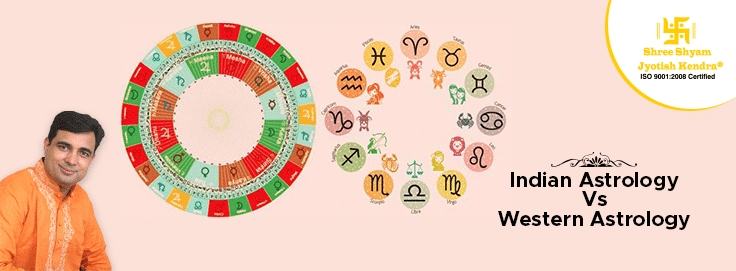
Indian astrology has been around for thousands of years, and it has spread across borders to reach people in different countries. It has created a significant influence on the way of life of many, including millions of westerners. However, in its journey from the Indian soil to the western lands, Astrology has taken on a different shape and form
You may have been confused a number of times upon hearing so many different versions of solutions based on astrology, even though you know that the origin of modern astrology is the same Vedic knowledge.
The western idea of astrology, even though we cannot call it completely wrong, is still somewhat flawed in a few of the most basic senses. How exactly? Here is a quick look at how Indian Astrology differs from Western Astrology.
How Is Indian Astrology Different From Western Astrology?
- Signs and Constellations
Many of us have noticed that the westerns signs and the signs in our traditional astrology have different starting dates, but a few common dates. This overlap happens because of the difference in the locations, which is why western astrology is often called the zodiac of signs while Vedic astrology is called the zodiac of constellations. - Connection with Philosophy
Vedic Astrology has been derived from our ancient philosophy of the Vedas, which is why a number of the fundamentals are common between it and Ayurveda. In fact, Astrology and Vastu also share a number of fundamentals and work together to create harmony. - Planets
Vedic astrology places its belief in the Navgraha or the nine planets. However, these planets are not what we generally think they are. Since planets like Neptune, Uranus, and Pluto are not visible to the naked eye, Vedic astrology never considered them as a part of the astrological system, which is why the planets till Saturn, sun, Moon, and nodes of the moon called Rahu and Ketu get special emphasis in Vedic Astrology. Western Astrology, on the other hand, puts emphasis on the outer planets as well. Another thing to note here is that Vedic astrology actually places a lot more significance on the rising sign and the moon than it does on the sun. - Nakshatra
While we all know about the 12 zodiac signs, Vedic astrology also uses a system of 27 moon signs, called Nakshatras. These moon signs are then each divided into 4 subsections or Padas, which totals up to 108 Nakshatra Padas. This is totally missing from the ideology of western astrology. - Remedial Measures
Vedic astrology puts a lot of belief on the cycle of Karma. Thus, it not only identifies the results of Karma in the past, present, and future but also suggests a number of corrective measures or Upayas to help an individual with the effects of bad Karma. Vedic astrology helps in improving the overall quality of life and bring balance to the energies of a person’s stars. One does not usually find the concept of Karma and rebalancing it in western astrology.
As talked about above, the idea of western astrology isn’t completely wrong or misguided; rather it differs from the astrology that our Vedas established for us. As an expert of Indian astrology, Pandit Pawan Kaushik believes in the scientific approach to astrology, a practice that is based on the study of our Vedas. To find help in your life, get in touch with Pt Pawan Kaushik. Book your appointment today.
 +91 9990176000
+91 9990176000 +91 9999097600
+91 9999097600
 CALENDAR 2024
CALENDAR 2024










